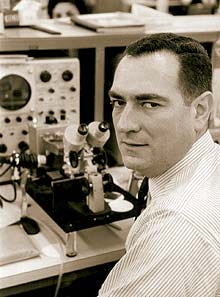Eugene Kleiner — the Austrian Pioneer of Silicon Valley
Kleiner-Perkins is a staple of Sand Hill road. Known for being early investors in over 300 technology & biotech companies including (Amazon, Google, Sun Microsystems, & more) — the firm has had tremendous success since being founded in 1972 by Eugene and Tom Perkins (Hewlett-Packard veteran).
As a proud Austrian-American, I was very excited to learn more about Eugene. Let’s face it, most people know of Austria for it’s skiing and schnitzel, but business role-models are somewhat scarce. We’ll always have Arnold Schwarzenegger, Dietrich Mateschitz from Red Bull, the Swarovski family, and a handful of other business masterminds. Eugene is different in that he is relatively unknown to the general population, despite his prolific impact on the world of Venture Capital.

Starting at Western Electric, Eugene eventually engulfed himself into the world of semiconductors. He worked closely with William Shockley before spinning off his own company, Fairchild Semiconductor. Alongside the so-called “Fairchild Eight” Eugene helped changed the world of semiconductors and then early-stage investing. In 1968 he invested some of his own money into Intel…I’m sure that investment paid off well! Many years later Fairchild’s spinoff companies are allegedly worth over $2 Trillion. That’s the current combined GDP of a few very established countries.
In his time as a prolific investor Kleiner developed a set of guiding principles know as Kleiner’s Laws. The laws are as following:
- Make sure the dog wants to eat the dog food. No matter how ground-breaking a new technology, how large a potential market, make certain customers actually want it.
- Build one business at a time. Most business plans are overly ambitious. Concentrate on being successful in one endeavor first.
- Risk up front, out early.
- The time to take the tarts is when they’re being passed.
- The problem with most companies is they don’t know what business they’re in.
- Even turkeys can fly in a high wind. In times of strong economies, even bad companies can look good.
- It’s easier to get a piece of an existing market than to create a new one.
- It’s difficult to see the picture when you’re inside the frame.
- After learning some of the tricks of the trade, some people think they know the trade.
- Venture capitalists will stop at nothing to copy success.
- Invest in people, not just products.
- When the money is available, take it.
- There is a time when panic is the appropriate response.
- The more difficult the decision, the less it matters what you choose.
I wanted to choose a few of these laws that I find most inspiring, and give my opinion on them many years later:
Make sure the dog wants to eat the dog food.
This screams product market fit to me, a highly emphasized phrase in the world of early stage investing. No matter how revolutionary a product or service is, companies need customers in order to make money. It is not valuable to overcomplicate things to the n’th degree like a Rube Goldberg Machine, focused on small & intricate processes, when you aren’t addressing an actual need in the market. This proven display of traction is a must for any post-seed (and often seed) investments.
Even turkeys can fly in a high wind. In times of strong economies, even bad companies can look good
When you hear this your mind should go straight to the early 2000’s & 2007. The diligence process is there for a reason, and I’m a firm believer that any investments (private or public) should never be made on hype. This is a cyclical trend, especially in the USA. There’s always a “cool” thing to be creating and investors must look through smoke & mirrors to recognize true value.
The more difficult the decision, the less it matters what you choose.
Probably the hardest for me to wrap my brain around initially. I naturally linked it back to Fredkin’s Paradox. My summary of the statement is that such a decision is less important since the case is strong for each side. Therefore the potential to get trapped in endless back-and-forth is dangerous and a decision should be made swiftly, to avoid wasting time.
I’m incredibly inspired by the work that Eugene Kleiner, and somewhat partial to him given both of our Austrian backgrounds. He unfortunately passed away in 2003, but Kleiner’s folklore & wisdom in the world of technology-investing will live in forever. Hopeful to continue seeing great business role-models coming from our beautiful country.
